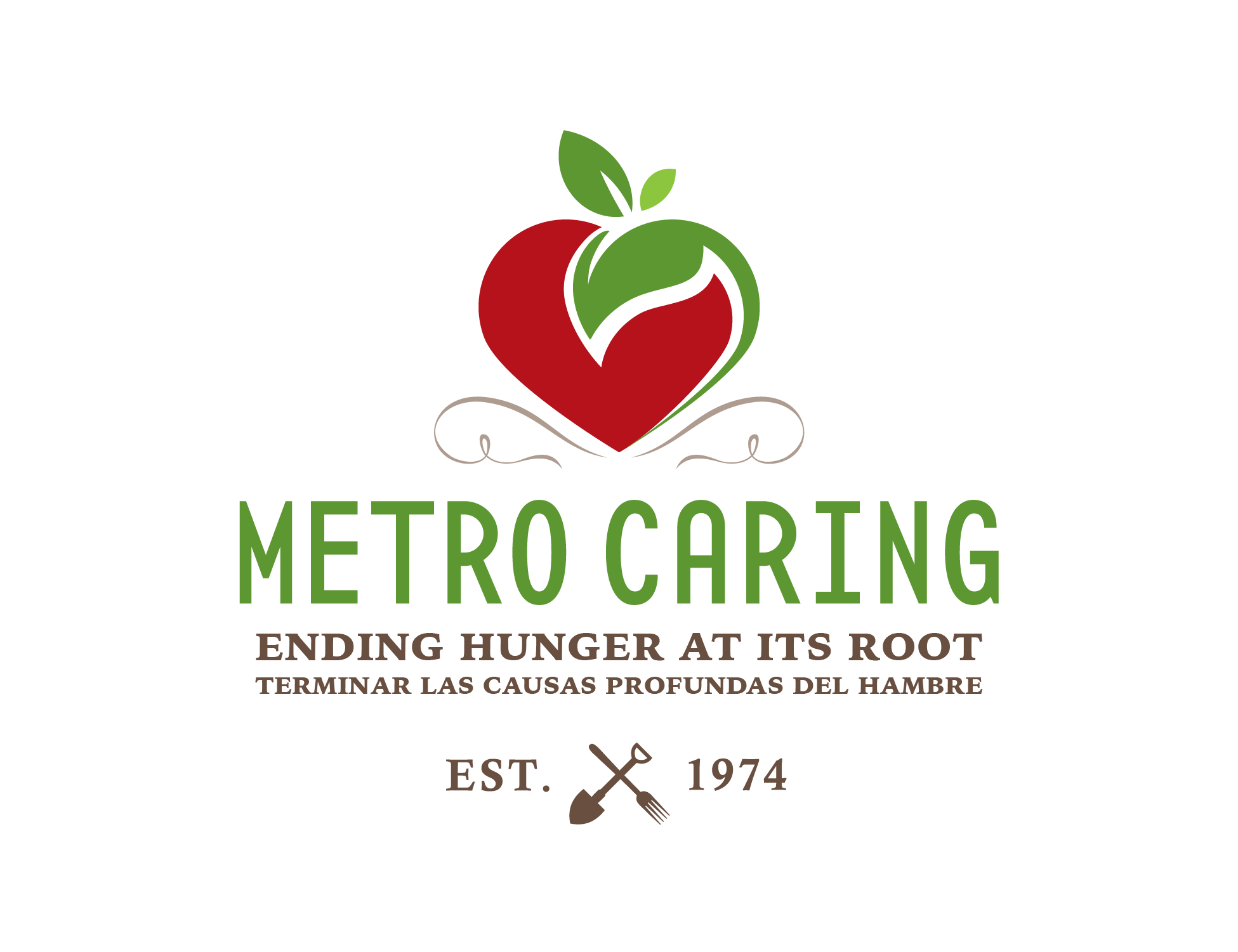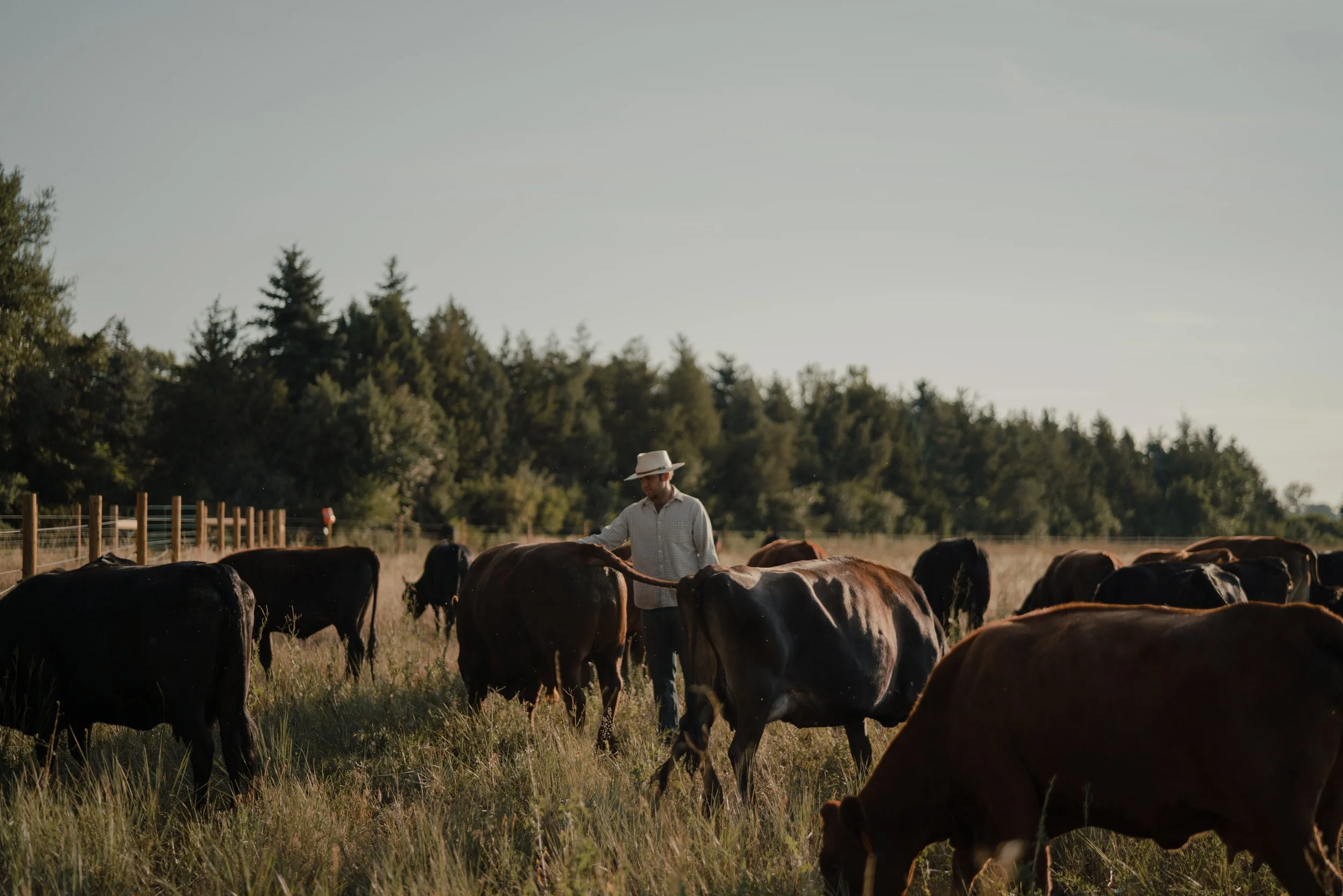Where does Metro Caring's local food come from?
How purchasing local food is better for our community and the Colorado economy
Andy Breiter, the rancher at Grama Grass & Livestock, partners with Metro Caring to bring fresh, locally raised beef to our community.
BY BRANDON McKINLEY
In the past four years, Metro Caring purchased more food for our Fresh Foods Market than ever before.
Originally, our market relied solely on donations. Now, thanks in part to funding from the U.S. Department of Agriculture’s Local Food Purchase Assistance Cooperative Agreement Program, we currently have over $400,000 annually to buy food. This program was created in response to the pandemic to provide American Rescue Plan dollars to local organizations and schools to purchase local food for people going hungry.
Cory Scrivner is Metro Caring’s Food Access Manager. Getting food for the Fresh Foods Market—Metro Caring’s free grocery store—falls on her team’s shoulders.
For decades, Metro Caring has prioritized fresh, healthy foods on the shelves because we believe everyone—Black, Brown, or white, Native, Colorado-born, or immigrant—deserves access to high-quality groceries.
Cory Scrivner, Metro Caring’s Food Access Manager, is responsible for the thousands of pounds of food our community takes home with them every week.
“If we were to feed people trash and contribute to their medical bills, contribute to obesity, and all of these negative outcomes, would we really be doing anti-hunger work?” Cory said. “The point is to restore power. It's not to keep people sick.”
With this additional food purchasing funds, Cory can order items like meat, milk, and eggs that our community wants and needs but are sparse to come by in donations. We currently purchase food directly from 11 local farms and ranches and indirectly from dozens more through our partnership with East Denver Food Hub.
Ahead of this year’s growing season, Cory made purchasing commitments with four Colorado producers. This provides farmers and ranchers with guaranteed income ahead of the season and provides the Metro Caring community with guaranteed local food.
So who is hard at work at these farms to bring fresh, healthy, Colorado food to our community?
Everyone deserves access to local food
Noelle Trueheart started Common Name Farm four year ago with Phil Cordelli.
Noelle Trueheart discovered farming by accident. While working as an archaeologist, she said she somehow ended up in an orchard on Colorado’s western slope.
“I was immediately like, ‘I have to learn everything about this,’” she said, sitting in a giant greenhouse in Lafayette where she now grows food for hundreds of households and a dozen community organizations, including Metro Caring.
Four years ago, Noelle joined Phil Cordelli to start Common Name Farm. The two had never farmed together before, but they shared a vision to serve their community.
Both Noelle and Phil had worked for other farms for years and watched as many of them donated the seconds and the leftovers to food pantries from time to time. Noelle and Phil thought they could do more.
“Food access and food justice are at the center of what we do,” Noelle said, adding that she and Phil want top-market quality produce to go to everyone.
Keeping those values at the center while running a for-profit farm means they must get creative. One of the ways they do this is by offering their Community Supported Agriculture—or CSA—shares on a sliding scale to make fresh, local food more accessible to the community.
Common Name Farm is one place Cory committed to purchasing food from. By budgeting our local procurement funding and committing to spending a certain amount with each farm, Cory can better strategize with farmers like Noelle and Phil to grow the foods our community needs.
Okra flowers in bloom at Common Name Farm.
A community-focused food economy
Cory approached Phil and Noelle about growing okra, an item highly desired by our community but difficult to come by in donations from grocery store rescues.
“We were like ‘Oh, hell yes!’” Phil said. “All we needed was an excuse to grow okra.”
Phil explained that okra is a long-season, tropical crop that poses some challenges for Colorado farmers. Uncertain of enough yield to justify the space needed to grow it in any quantity, they generally kept their okra growth minimal. But with the commitment from Metro Caring to buy all they can grow, they are growing even more of the African crop this year.
“Sure, we could sell all our okra for a lot more money at a farmer’s market,” Phil shared. “But there’s real uncertainty in that. What if it’s rainy the day we take it? With the Metro Caring partnership, we’re not aiming for top dollar. We value the certainty that everything we grow is spoken for.”
When you face hunger, you often lose a lot of agency in choosing the foods that are important to you. Even with money in your pocket, asking your local Safeway to stock a new item you want might not end in success. But at Metro Caring, this is precisely how Cory procures food.
“With local funding, the first thing we want to do is get folks the things they want,” Cory said.
The people growing our food are going hungry
Kevin Oster is the farm manager at Ekar Farm.
Before the pandemic, Kevin Oster was living in New York City as an investment banker. He discovered he hated it, so he moved to Colorado and began studying environmental science. He found his way to Ekar Farm, where he is now the farm manager.
“I feel really lucky that I found farming,” Kevin said. “I didn’t grow up around farming or going to farmer’s markets, but I’ve found farming is very healing. It feels like I found my career.”
Talk with Kevin about farming and you’ll know right away he hasn’t regretted his career change. But he came face-to-face with the stark reality that farmers are often paid so little they could qualify for food assistance programs themselves.
According to the 2023 Colorado Health Access Survey, people working in farming and ranching communities often aren’t getting enough to eat. Places like the San Luis Valley, southeast Colorado, and Weld County—where agriculture is at the center of the economy—all have some of the highest rates of hunger.
Underpaying farmers stretches back to farming’s history with enslaved labor and exploiting migrant workers, Kevin shared.
One of his goals is to create a farming culture where people can stay in farming, which requires paying farmers fairly so that they can afford healthcare, housing, and food for themselves. It’s one of the reasons Cory feels so strongly about making pre-season buying commitments, including to Ekar Farm.
“Providing that little bit of security for farmers goes a long way,” Kevin said.
Noelle and Phil at Common Name Farm.
Knowing your farmers and ranchers
Cory said it’s important to find producers who share Metro Caring’s values, which is why she developed partnerships with Andy Breiter of Grama Grass & Livestock and Rachael Wood of Woods Family Ranch. Andy and Rachael both practice regenerative agriculture, which builds the health of the soil and focuses on reversing climate change.
Meat is one of the most desired food groups among Fresh Foods Market shoppers because of its high price point. Most of Metro Caring’s meat comes frozen from The Emergency Food Assistance Program run by the USDA. However, through purchasing agreements with Grama Grass and Woods Family Ranch, Cory is getting more local meat to the market.
“Honestly, we have no idea where TEFAP meat comes from or how long it’s been frozen,” Cory said. “But the meat we get from our local partners is fresh. We know what the animals ate and how they were raised.”
Metro Caring is currently running a fundraising to purchase a whole cow from Grama Grass, which would bring 500 pounds of fresh, Colorado beef to people shopping in the Fresh Foods Market.
Knowing who grows our food gives us a better understanding of what we’re making available to our community. Our partners at Ekar and Common Name Farm agree.
“When you know the person who grows your food, when you cook with them and grow it with them, there's something special about it,” Kevin said.
Phil says there’s a really deep connection between people and food.
“We've had multiple instances in our farming practices where a vegetable we grew was the first solid food that a child ate,” he said. “There's just something so powerful about that.”
For Noelle, food is her love language.
“Food is love for people,” she said. “It's culture and it's knowledge and wisdom. It's so much what makes us human and I feel fortunate that I get to grow this food for people.”
We couldn’t agree more, Noelle.
***
While Metro Caring’s food purchasing budget has grown exponentially, Cory says it only accounts for 11% of the food in the Fresh Foods Market. As we continue to explore how food access can be more equitable for everyone, Cory hopes to see that percentage grow.
“Our society has gotten away from valuing real, whole, local nutritious food, and there are real barriers to keep that food away from certain communities,” Cory said. “Food is not just a commodity. Food is at the center of our humanity.”
Looking to buy your produce locally?
You can find Common Name Farm at the City Park Farmer’s Market this year or get weekly produce by purchasing a share of their CSA. Or look for Grama Grass & Livestock at the Boulder farmer’s market.
Learn more about Metro Caring’s work to de-commodify food and embrace food as a human right by exploring our Universal Basic Food initiative.






